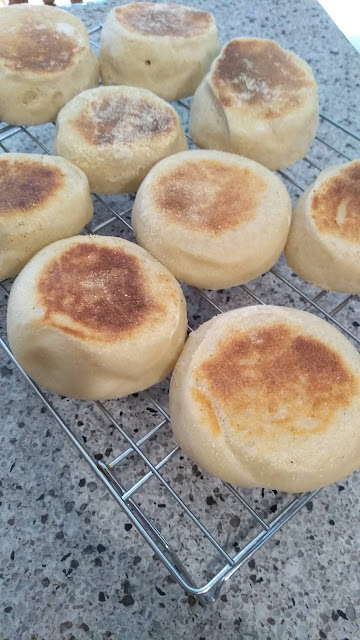About a week ago, a friend shared some of her sourdough starter with me. She had casually mentioned that she was making a sourdough loaf, and I had been wanting to try sourdough for a while, so I asked if she would share some of her starter. Of course she said yes, and then she actually followed through, and I wasn't quite ready for it, but now I am equal parts obsessed and overwhelmed.
In the intervening week, I've made English muffins, waffles, and cinnamon rolls. It's kind of magic. I am amazed every time that the dough actually rises. Next up I'm planning a honey wheat sandwich bread and oatmeal chocolate chip cookies.
In case you're not quite sure what sourdough starter is, I'll tell you: it's a culture of captured wild yeast that can be used to make bread doughs rise. The starter contains the yeast, along with food for the yeast: a mixture of flour and water. It's kind of a commitment, because sourdough starter is something that needs to be fed and tended to regularly. This is the way folks used to make bread rise before yeast in a packet became a thing.
Sourdough is also a commitment in that it requires planning ahead. It takes about 24 hours, sometimes more, to make a loaf, as opposed to around 4 hours using commercial yeast. Before this past week, I never really understood why the Hebrews were instructed to eat unleavened bread on the night of the very first Passover--the night the Hebrews escaped the tyranny of Pharaoh. See, I've been baking bread for almost my whole life. And yes, homemade bread takes time because it needs to rise, but surely the Hebrews would have had time to bake leavened bread.
But y'all. The enslaved Hebrews didn't have dry yeast laying around. There was no running to the grocery store to buy a packet of yeast. They would have had levain--sourdough starter--a culture of wild yeast in a slurry of flour and water. There simply wasn't time to bake sourdough bread before leaving town. In fact, I suspect the Hebrews used up their unfed sourdough starter to make their unleavened bread. It's not like they were going to have access to flour and water to maintain their levain while wandering in the desert.
This is just another example, I guess, of how we miss so much of the nuance in the Bible because we're not aware of the cultural context or significance of what we're reading. Now, at least in this instance, I have just a little more perspective, and when I'm working with my levain I can feel a little connection to those ancient bread-makers.


No comments:
Post a Comment